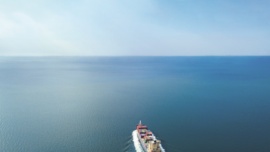Javier Solana was EU High Representative for Foreign and Security Policy, Secretary-General of NATO, and Foreign Minister of Spain It is safe to say that the most consequential geostrategic development of the last two decades has been Chinas rise. Yet the West has failed to accord China not to mention the other major emerging economies the degree of influence in todays global governance structures that it merits. This may be about to change. As it stands, China relies on bilateral arrangements to deepen its involvement in countries across Asia, Africa, and Latin America. Backed by US$3.8 trillion in currency reserves, China has provided infrastructure investment in exchange for commodities, thereby becoming the worlds largest provider of financing for developing countries, with the China Development Bank already offering more loans than the World Bank. But, given that these bilateral arrangements are executed by state-owned corporations, they often do not adhere to international best practices. The West has therefore urged China to move toward multilateral processes that meet international standards, while doing more to provide global public goods. US President Barack Obama has gone so far as to call China a free rider for its failure to fulfil the responsibilities that many would expect of a global power. But, if Chinese President Xi Jinpings recent foreign-policy initiatives are any indication, change may be imminent. Last July, China led the establishment of the New Development Bank by the five BRICS countries (Brazil, Russia, India, China, and South Africa) and contributed significantly to its US$100 billion endowment. Likewise, at the latest Asia-Pacific Economic Cooperation meeting in Beijing, China spearheaded the creation of the Asian Infrastructure Investment Bank (AIIB). And it has established a US$40 billion Silk Road Fund, to support its ambitions to re-create the ancient overland and maritime routes connecting Asia to Europe. In implementing its so-called one belt, one road strategy, China will pursue investments affecting some 60 countries including in Central Asia, where its portfolio already contains projects worth more than US$50 billion. The maritime route will include the Indian Ocean, the South China Sea, and the Mediterranean. Together, they will form not just a road, but a network to facilitate the transfer of goods and ideas across Eurasia. Europes role in this initiative is already emerging with the Greek port of Piraeus, operated partly by the Chinese state-owned naval company COSCO, set to be a stop on the maritime route. The Piraeus port will be connected to the rest of Europe by Chinese-financed infrastructure in the Balkans and Hungary, consolidating Chinas position as the European Unions main commercial partner. The New Silk Road initiative reaffirms Chinas desire to establish itself as a Eurasian power. Not only will it connect the dynamic economic hubs of East Asia and Western Europe; it will also open access to Central Asian countries, where Russias influence is in decline. It could also help to ease territorial tensions between China and its immediate neighbours. So far, Chinas efforts to increase its influence seem to be working and not just in the developing world. The United Kingdom recently announced its intention to serve as a founding member of the AIIB, triggering a flood of applications from the likes of Australia, Brazil, France, Germany, Korea, Russia, Turkey, and Spain. In the US, however, such developments are perceived as geopolitical setbacks. This interpretation is fundamentally flawed. After all, Chinas decision to bypass the main international financial institutions, which were created in the aftermath of World War II, has been driven by the refusal of the developed countries that lead them to give it a role commensurate with its economic might. At the Asian Development Bank, for example, Japan and the US each claim around 13% of the votes, compared to less than 6% for China, and the president is always Japanese. A similar situation prevails at the World Bank, where an American is always in charge, and the International Monetary Fund, where the managing director is always a European. Though the G-20 countries agreed in 2010 to increase Chinas IMF quota from 3.65% to 6.19% a small step in the right direction the US Congress has refused to ratify the agreement, preventing the reforms from being implemented. The fact is that Chinas new initiatives are not revisionist, but reactive. If new powers are not given access to the existing global governance structures, they will create structures of their own. This means that the advanced countries have the power to prevent the international orders fragmentation into ideological and economic blocs but only if they can overcome their strategic mistrust of China. In this sense, the participation of more European countries in the AIIB is a positive development, as it helps to ensure that the new bank complements, rather than rivals, existing institutions. (In fact, Europes impact would be even greater if the EU, rather than individual members, was represented at the AIIB, as it is at the G-20 and the World Trade Organization.) The West must still do more not only to welcome China to the table of global governance, but also to accept and cooperate with the institutions that the Chinese are now creating. Only with an open attitude can Western leaders ensure that Chinese-led institutions adopt best practices of multilateralism and accountability, and that they adhere to international labour and environmental standards. Now is the ideal time to initiate this process. If the EU, the US, and China take this year to align their intentions, based on their shared interests, they will be prepared to make the most of the G-20 summit in China in 2016. Chinas move into multilateral processes is good news for the world. Europe and especially the US must overcome their strategic mistrust of China. They must not squander the opportunity to participate in and shape these processes, so that the benefits are shared as widely as possible. Project Syndicate
Top Stories
RELATED ARTICLESMORE FROM AUTHOR
OPINION – Enhancing Tourist Experience and Protection: Recommendations for the Historic Centre of Macau
Macau, as a travel destination, is world-renowned for its vibrant entertainment gambling, rich cultural heritage,...
OPINION – The Influence of Many, the Power of One
In January of this year, I reached out to my Corporate Social Responsibility expert colleagues...
OPINION – Blue natural assets
The sea seems cheap. Water does not have to be built (like railways) or repaired...
【主編前言】撤辣同時要考慮助置業措施
多年前隨著博彩旅遊業帶動經濟發展,樓市價格飇升,政府於2010年實施一系列辣招以遏止炒賣,穩定樓市,其中包括稅務及樓宇按揭在內的不動產需求管理措施,稅務措施包括特別印花稅、額外印花稅及取得印花稅。























